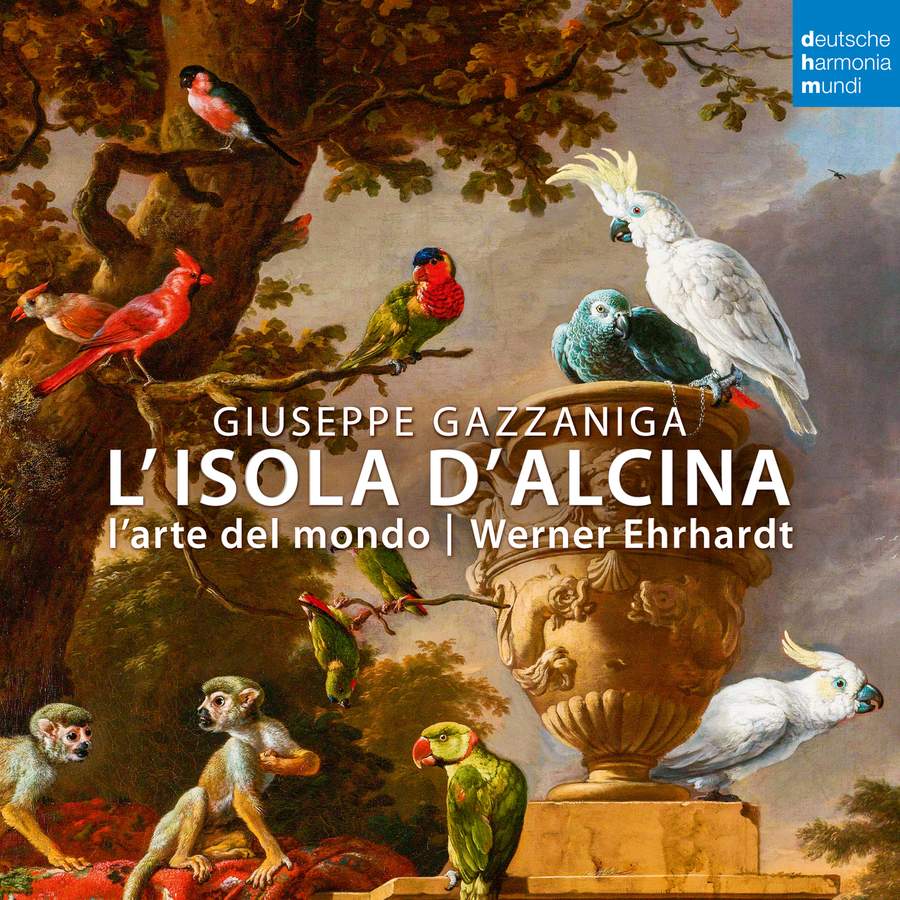GAZZANIGA L'isola d'Alcina (Ehrhardt)
View record and artist detailsRecord and Artist Details
Composer or Director: William Wallace
Genre:
Vocal
Label: Deutsche Harmonia Mundi
Magazine Review Date: 02/2024
Media Format: CD or Download
Media Runtime: 132
Mastering:
DDD
Catalogue Number: 19658 81347-2

Tracks:
| Composition | Artist Credit |
|---|---|
| (L')Isola d'Alcina |
Giuseppe Gazzaniga, Composer
Alice Madeddu, Lesbia, Soprano Enrico Iviglia, Brunoro, Tenor Ensemble l'arte del mondo Florian Gotz, Baron von Brikbrak, Baritone Francesca Lombardi Mazzulli, Alcina, Soprano José Antonio Lopez, Don Lopes, Bass Kaëlig Boché, La Rose, Tenor Margherita Maria Sala, Clizia, Alto Werner Ehrhardt, Conductor William Wallace, Composer |
Author: David Vickers
If you have already heard of Giuseppe Gazzaniga it is probably because his ‘Don Giovanni’ middle act in Il capriccio drammatico (Venice, 1787) was one of da Ponte’s models for Mozart. After studying with Porpora and Piccinni, he composed more than 50 opere buffe for every major Italian city, and eventually settled down as maestro di cappella at Crema Cathedral. L’isola d’Alcina (Venice, 1772) is set on the island of the femme fatale of Ariosto’s Orlando furioso but in the present (18th-century) day. Now at least 800 years old, the sorceress is still up to her old tricks of turning discarded lovers into wild animals and plants. The plot is like the gambit of a ‘walks into a bar’ joke: an Italian, Frenchman, German, Englishman and Spaniard are stranded on Alcina’s enchanted island. Inevitably, most of them succumb to her spells before managing to escape – the Spaniard and Italian accompanied by their new fiancées Clizia and Lesbia (both of whom have become fed up working for Alcina).
Werner Ehrhardt uses a performing edition based on two manuscripts copied in Vienna at around the time of a production there in 1774. Relentlessly over-fussy fortepiano continuo in recitatives outstays its welcome, as does the frequent integration of anachronistic musical puns. In other respects, the shaping of textures and pacing of the drama are consistently astute. L’Arte del Mondo’s responsive strings, warmly coloured woodwinds and precise brass bring spirited élan to the three-movement Sinfonia. There is conviviality in the first scene’s quartets for the shipwrecked Brunoro (the Italian), La Rose (the Frenchman), James (the Englishman) and Don Lopes (the Spaniard) as they reach the island, marvel at its beauty and fall asleep.
Lesbia’s warning to the men about Alcina (‘In quel volto amor’) is interpreted flirtatiously by Alice Madeddu, and Don Lopes’s over-the-top vow that they shall remain immune to the sorceress (‘Per l’insigne Durlindana’) has copious literary allusions enunciated bluffly by José Antonio López. The prompt abandonment of the men’s resolve is characterised amusingly in La Rose’s lyrical ‘A la charmante Alcina’ (sung elegantly by Kaëlig Boché) and Brunoro’s ambition to impress with stereotypically Italianate coloratura in ‘Donna, che in volto è bella’ (Enrico Iviglia navigates the pyrotechnics exuberantly). The Englishman’s hypocritical catalogue aria listing women around the world who never stop sighing with love for him (‘Due Baronesse amabili’) is sung cheekily by William Wallace.
The librettist Giovanni Bertati makes merry with national stereotypes and mixes up languages for comedic effect. Playful shenanigans in the Act 1 finale throw in Spanish, French and Venetian songs when the men drink too deeply from Alcina’s fountain and are driven mad with desire for her. Moreover, in Act 2 the lost men are found by their friend Baron von Brikbrak (a German who speaks appalling Italian), who is inoculated against Alcina because his ears are stuffed with beeswax and his eyes are bathed in bat’s blood; Florian Götz has audible fun acting the buffo fool, especially when Don Lopes has to correct the German’s hilarious misreading of a document instructing them how to defeat Alcina. The sorceress does not dominate this ensemble opera as much as one might expect, although Francesca Lombardi Mazzulli demonstrates versatility at the character’s breezy seductiveness, gleeful mischief, feisty disorientation and lonely pensiveness. The brief Act 3 seems underdeveloped, but Gazzaniga’s opera offers plenty of entertaining music and theatrical extroversion.
Discover the world's largest classical music catalogue with Presto Music.

Gramophone Digital Club
- Digital Edition
- Digital Archive
- Reviews Database
- Full website access
From £8.75 / month
Subscribe
Gramophone Full Club
- Print Edition
- Digital Edition
- Digital Archive
- Reviews Database
- Full website access
From £11.00 / month
Subscribe
If you are a library, university or other organisation that would be interested in an institutional subscription to Gramophone please click here for further information.




